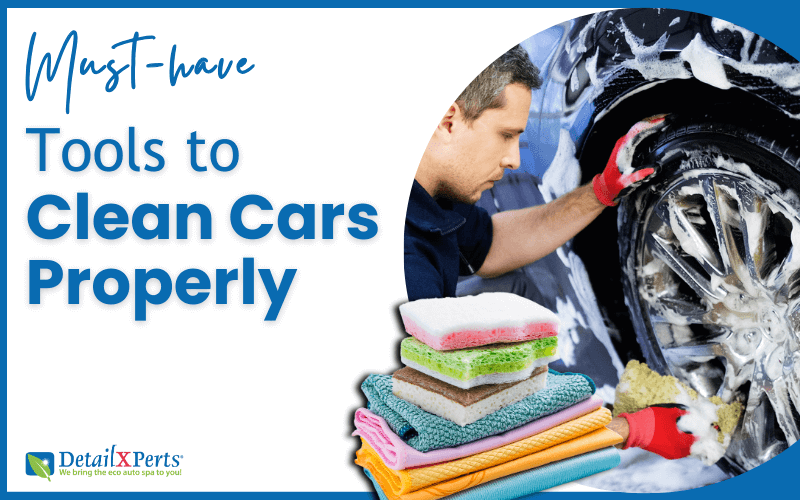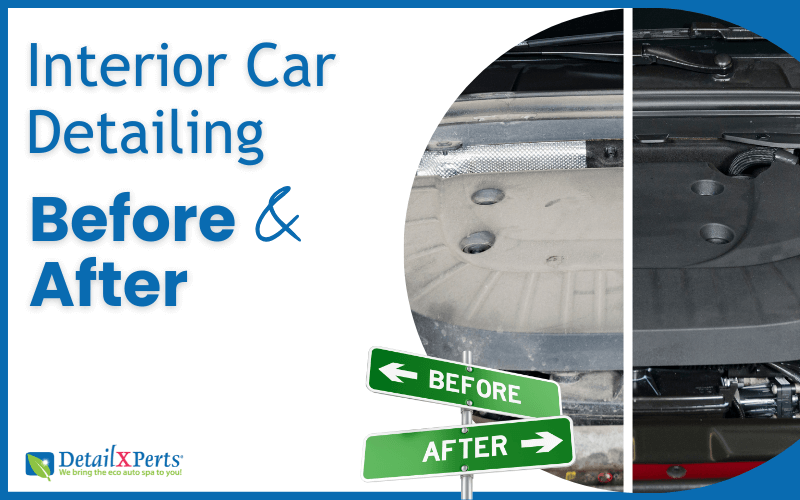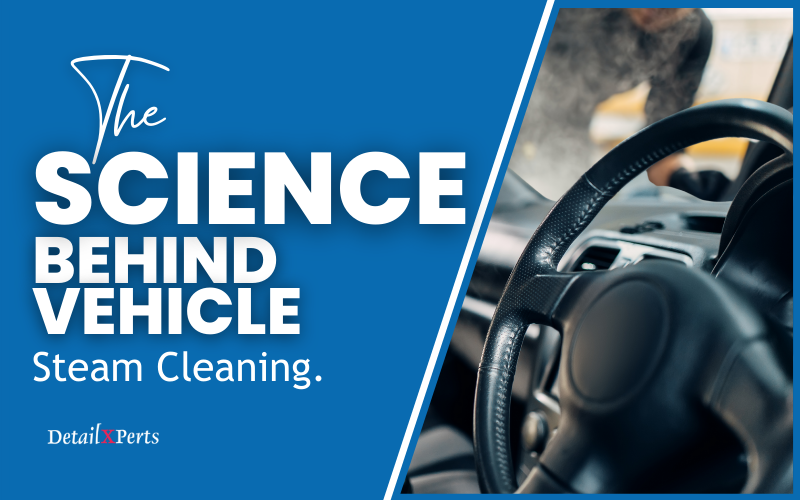Investing in reliable car interior detailing tools will help keep your vehicle in top condition. Yes, there is an initial outlay. However, you can save money in the long run by looking after your interior surfaces, such as upholstery and carpets. Moreover, your car interior detailing efforts will create a healthier space for you and your passengers.
Best Car Interior Tools to Maintain Your Vehicle
Knowing how to detail a car interior becomes easier with the proper tools. Here are our top recommendations.
Car Vacuum Cleaner
A car vacuum cleaner is one of the car interior detailing tools you can’t do without. It’s the quickest and most efficient way to remove dust, dirt, pet hair, and other contaminants from your car interior.
Look for models that include a range of attachments, too. These will help you access and clean confined spaces. The best car vacuum cleaners range from professional-grade cleaning models to cordless handheld vacuums.
Tip: You also have the option of a wet-dry vacuum. The wet feature removes stains and liquids from carpets, upholstery, and other surfaces. For more tips, see how to vacuum your car.
Steam Cleaner
Researchers have discovered that a car interior is often dirtier than a toilet. Crumbs and spillages on carpets, seats, and upholstery are prime spots for germs to thrive. Therefore, your list of must-have interior detailing tools should include a steam cleaner for cars.
Using steam is probably the best way to detail car interior. The science behind steam cleaning is simple but effective. The high steam temperature safely sanitizes surfaces, killing up to 99% of harmful germs and bacteria.
However, if you don’t want to invest in this equipment or you simply don’t have room to store it at home, then seek out car detailing that comes to you. For example, DetailXPerts uses the latest steam technology to guarantee a superior clean.
Tip: Steam also removes odors from your car interior. This makes it ideal if you don’t want to spend additional money on an ozone generator, a specialist machine used to remove indoor air contaminants.
Auto Detailing Brush Set
The right car interior detailing brush will speed up your car detailing process. For example, brushes with rubber bristles are ideal when you need to remove pet hair from your car’s interior.
For more stubborn areas of dirt on mats and carpets, choose a specialized brush with stiff nylon bristles. This type of brush agitates stubborn dirt trapped in the grooves on mats. It is also suitable for cleaning car pedals that often collect mud and dirt from shoes.
Tip: Be careful which type of brush you use on leather upholstery. Choose a high-quality brush with durable, soft bristles specifically designed for this material. Also, check out our video on steam cleaning leather seats:
Interior Detailing Air Gun
We know dust and dirt can get everywhere in the car. For example, seat runners, dashboard, air vents, and seams in upholstery easily attract dirt. That’s why an auto detailing air gun comes in useful. This powerful piece of equipment effortlessly blows debris and moisture from those awkward, hard-to-reach places. It is easy to use and a great time saver.
Microfiber Cloths
Add microfiber cloths to your list of must-have car interior detailing tools. The cloths allow you to dry surfaces faster and more effectively without scratching surfaces. There is a range of cloths for auto detailing, so look for the different designs.
For example, micro-chenille is best for the dashboard and console. Meanwhile, general-purpose microfiber cloths are good for wiping plastics, painted surfaces, glass, and leather. You can use waffle weave to get streak-free windows.
Tip: Wash your microfiber car cloths for interior separately from other items to prevent them from picking up lint. Use a gentle detergent to keep the cloths in good condition. And avoid using a fabric softener because it can affect the absorbency of the cloths.
Car Interior Detailing Products
The best car interior detailing products will help you clean and polish the inside of your car. For example:
- All-purpose cleaner to brighten and condition all your car interior surfaces. For instance, Meguiar’s Ultimate Interior Detailer is safe to use on all interior surfaces. It also contains UV protection to help prevent hard surfaces from fading and cracking in direct sunlight.
- Glass cleaner, specially created to wash your car’s windows without streaking
- Mat cleaner to remove stubborn dirt
- Sanitizing spray
Tip: When using store-bought products, keep car doors and windows open while you work to allow plenty of ventilation. Some fumes can be unpleasant in a closed environment.
Auto Detailing Cleaning Gel
Use a cleaning gel for those hard-to-reach areas. Simply press the gel on the areas you want to clean – AC vents, cup holders, or small crevices. You’ll see all the dust and dirt sticking to the gel as you remove it. Easy does it!
Tip: Do not wash your cleaning gel. Instead, reuse it until the color goes dark. Remember, the gel has multiple uses around the home, too. For example, it is ideal for cleaning computer keyboards, TV remotes, and cell phones.
Multi-Purpose Scrub Pad
Useful car interior detailing tools include a multi-purpose scrub pad with a coarse and smooth side. The hooked nylon bristles on one side are great for scrubbing stubborn stains. Just put some cleaner onto the pad and gently scrub the area you wish to clean. Rinse with warm water. Then use the smooth microfiber side to wipe away any residue.
Tip: Buy a dirt trap bucket insert if you are working with a scrub pad and a bucket of water. This handy insert traps dirt at the bottom of the bucket, filtering fresh water to the top.
Stain Remover
How to remove stains from car seats? Sometimes they’ll need more than a rub with soap and water. Therefore, specific shop-bought cleaners for tackling tough stains and watermarks are a good idea. And they will come in useful for stained carpets, too.
Alternatively, you can use homemade remedies using everyday items from your store cupboard. For example, distilled white vinegar is a great car carpet stain remover. Or make a baking soda paste to remove mold from carpets.
Tip: If stain remover doesn’t work, then why not contact DetailXPerts to try our eco car interior detailing service. We use steam to break down dirt and remove stains.
Organizer for Car Interior Detailing Tools
One last thing, it is worth buying a detailing bag or trolley to store your car interior detailing tools, such as bottles, brushes, cloths, and pads. It keeps everything neat and tidy.
For example, a specially designed detailing bag has individual sections, zip pockets, and bottle slots to hold your items securely. Practical and portable, your car interior detailing kit ensures everything is at hand when you need it.
Conclusion
These recommended car interior detailing tools are great if you are passionate about car care. They are time-saving and effective, transforming your car interior into a hygienic and healthy space. To sum up, investing in these items can be a smart decision provided you know what you’re doing and have the time to use them.








